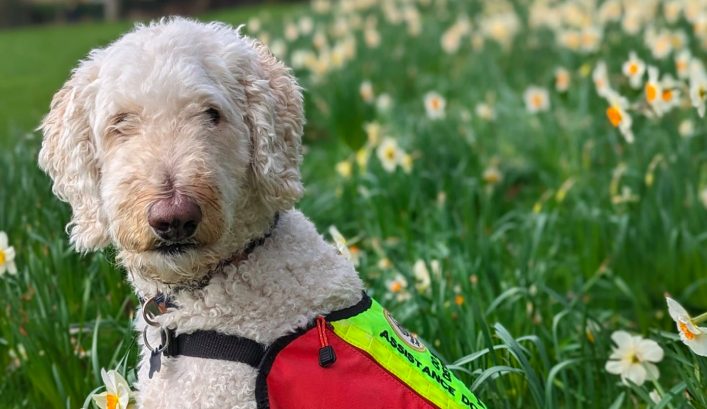An assistance dog charity has launched a new campaign called Celebrating Partnerships, to raise funds and recruit more trainers.
The charity Dog A.I.D. pairs those with dogs – but who need assistance dogs – with professionals who can help to train their dog.
This campaign aims to raise £15,000, recruit an extra 35 trainers into their network and celebrate the charity’s work.
Laura Jackson-Tyler, fundraising officer for Dog A.I.D., said: “The campaign is based around showcasing the achievements of our clients, trainers, businesses that support us, and funders that help keep the charity going.”
Dog A.I.D. trainers are experienced trainers who use reward-based methods and adaptive training styles to meet the needs of each client.
Last year Dog A.I.D. saw 17 clients’ dogs qualify to Assistance Dog status – this process usually takes between one and two years.
To qualify for training a client must be physically disabled. People who qualify often have conditions that reduce mobility like arthritis or wheelchair use.
Tara Patrick, grants, finance and admin manager for Dog A.I.D., said: “Our work is unique in that we have 90 wonderful volunteer professional dog trainers who work with clients in their own homes, to help them train their pet dog to reach the high standards needed to become a qualified ADUK-recognised Assistance Dog.
“We see reduced reliance on emergency medical interventions, carers, friends, and family over many years. Many clients, and often their carers, also return to work.”

Like the organisation Guide Dogs, Dog A.I.D. is accredited by Assistance Dogs International, an international non-profit authority, and a member of Assistance Dogs UK.
Dog A.I.D. was set up in 1992. Their dogs assist people with practical tasks, supporting them emotionally as well as physically, reducing their isolation and need for constant care.
By training a client’s own dog to meet their needs, Dog A.I.D. cites increased independence, social interaction, and self-confidence psycho-social well-being. Reduction in social isolation or reliance on family members and health services can also be an outcome of their work.
Dog A.I.D. receives no funding from the government, so funding for all their work relies on grants, donations, and legacies.
The charity is based in Shrewsbury, Shropshire, but their trainers operate nationally especially in areas of high demand.
Lorraine Benham, Dog A.I.D.’s senior training advisor, said: “I was asked by an existing client if I would apply to be a trainer with Dog A.I.D. to support them through the process.
“I love being able to use my years of experience in both dog training and supporting people to enable individuals to increase their independence and build a strong relationship with their dog. This training and support can be life changing for individuals and increase their independence and wellbeing.
“Trust and respect makes the whole process easier for both client and dog. The programme strengthens existing bonds even more through training and working together.”
The dogs have to be at least one year old before entering training and before someone can go on register of interest they must meet this criteria.
Dog A.I.D. asks that professional and qualified trainers volunteer their time to assist those in need and offer direct support to their volunteers.
Lorraine said: ”Dog A.I.D. offer ongoing support to trainers through one-to-one virtual support, regular webinars and training. They provide face to face workshops to improve and build on existing skills. In the near future they will be offering courses specific to the service that Dog A.I.D. provide.”
With the recent economic challenges facing the nation, Dog A.I.D’s trainers have had to prioritise their paid work, placing extra stress on the charity’s vital work.
Visit www.dogaid.org.uk to learn more.




